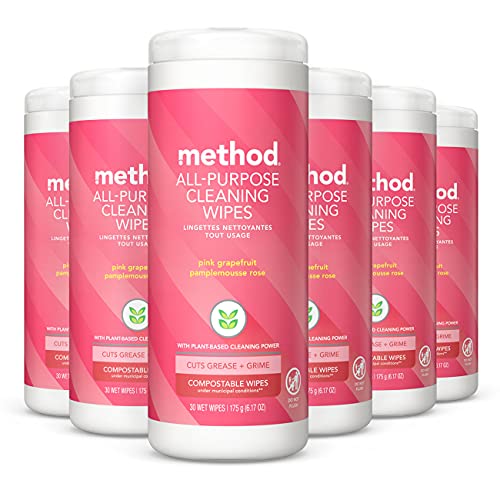
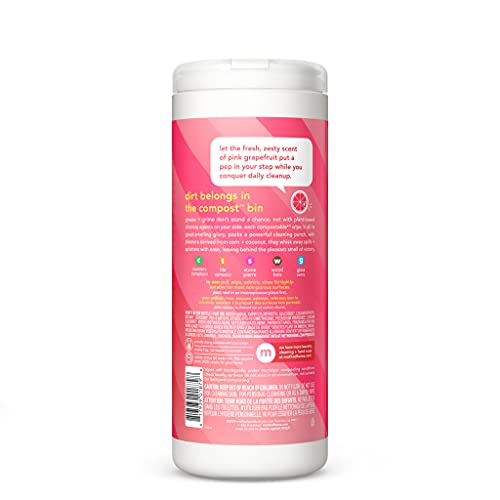
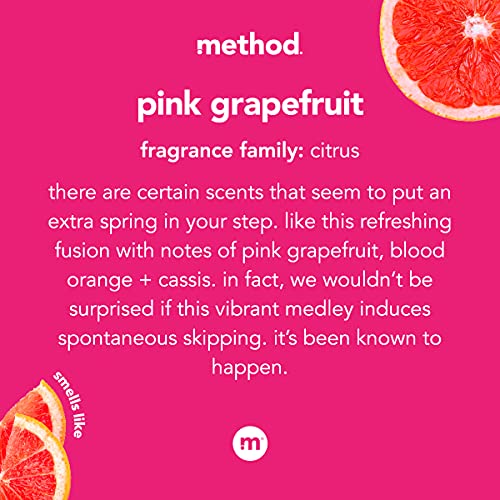
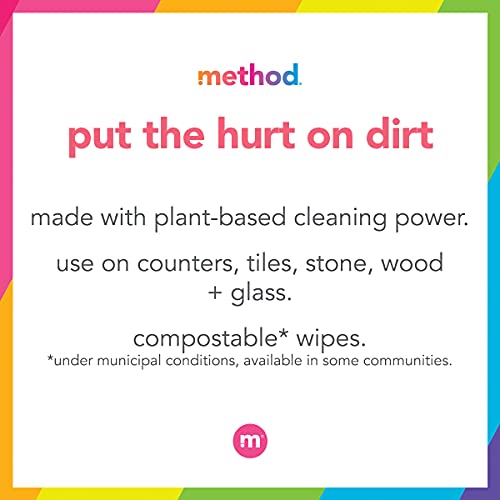
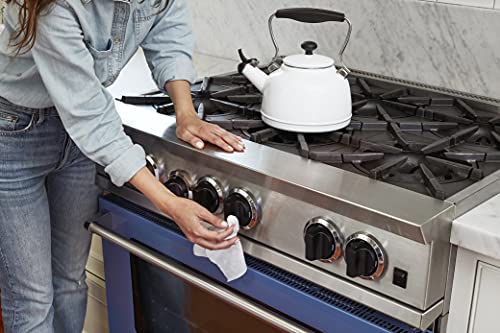
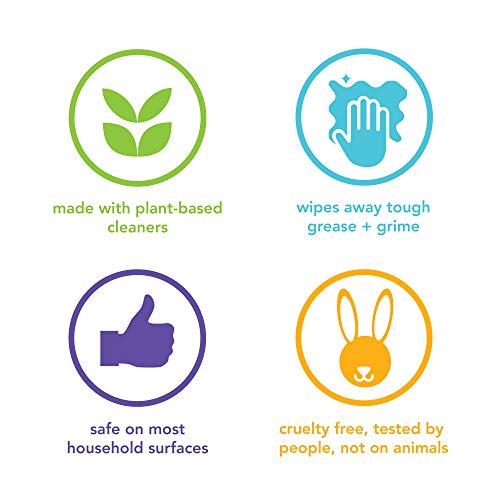
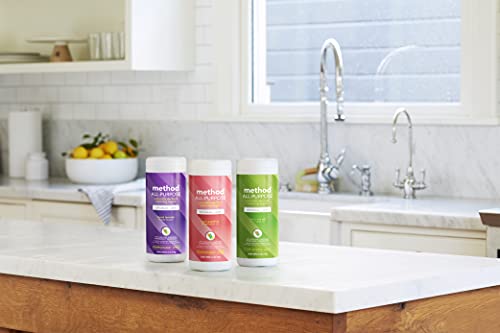
Method All-Purpose Cleaning Wipes - Plant-Based Power, Compostable, Pink Grapefruit Scent - 30 Count


Potassium Hydroxide
High RiskPotassium hydroxide is a caustic inorganic base commonly used in various products for its ability to adjust pH levels and act as a cleaning agent. It is highly soluble in water and can produce heat upon dissolution, making it effective in certain formulations.
Sustai Insights
Potassium hydroxide serves as a strong pH adjuster and cleaning agent, but it poses significant health risks due to its caustic nature, which can cause irritation to skin and eyes. Environmental concerns include its potential to contribute to water pollution. Regulatory bodies have imposed strict usage restrictions due to these hazards, leading to a high-risk overall assessment. Safe handling practices are essential, and alternatives such as citric acid may provide safer pH adjustment without the associated risks.
Methylisothiazolinone
High RiskMethylisothiazolinone is a widely-used preservative in cosmetic and personal care products, known for its antimicrobial properties. It helps prevent the growth of bacteria and fungi, extending the shelf life of formulations. It is often used in leave-on and rinse-off products, including lotions and shampoos.
Sustai Insights
Methylisothiazolinone serves as an effective preservative, combating microbial growth in various personal care items. However, it is associated with a high risk of allergic reactions and skin sensitization, especially in individuals exposed repeatedly. Regulatory bodies have imposed use restrictions due to these health concerns. Additionally, while it is not considered a carcinogen, its environmental impact includes potential pollutant characteristics. Overall, the risk associated with methylisothiazolinone is high, prompting caution and consideration of safer alternatives.
Cocamidopropyl Betaine
High RiskCocamidopropyl betaine is a synthetic surfactant derived from coconut oil, commonly used in personal care products for its mild cleansing and foaming properties. It functions as a surfactant, emulsifier, and thickening agent, contributing to the texture and performance of formulations.
Sustai Insights
Cocamidopropyl betaine offers functional benefits as a gentle surfactant, enhancing product foaming and texture. However, it may pose low to moderate allergenic risks and is subject to high use restrictions due to contamination concerns. Regulatory bodies have advised on its safe levels of usage, categorizing its risk level as high overall. Users should practice caution, particularly with sensitive populations, and consider alternatives like naturally derived surfactants for safer formulations.
Phenoxyethanol
Medium RiskPhenoxyethanol is a preservative used in cosmetics and personal care products to prevent microbial growth and extend shelf life. It is commonly found in formulations such as lotions, creams, and serums.
Sustai Insights
Phenoxyethanol serves effectively as a preservative, ensuring product stability and safety by inhibiting microbial growth. It is considered to have low health risks regarding carcinogenicity, allergies, and reproductive toxicity. However, moderate use restrictions exist, and regulatory bodies have advised caution in specific applications. Environmental concerns include its potential as a pollutant, although it is not highly bioaccumulative. Overall, the ingredient presents a medium risk level, with safe usage practices recommended and alternative preservatives available for those seeking greener options.
Water
Low RiskWater is a clear, colorless liquid essential for various biological processes. It serves as a solvent in formulations, facilitating the dissolution of other ingredients and enhancing product texture and application. Additionally, water plays a crucial role in hydration and is a key component in many cosmetic and personal care products.
Sustai Insights
Water is an effective solvent and hydrator, contributing to the texture and efficacy of formulations. It is biodegradable and generally regarded as safe, with low concerns regarding carcinogenicity, allergies, and reproductive toxicity. However, excessive water usage can lead to environmental concerns, particularly regarding resource depletion. Regulatory bodies do not impose restrictions on water use in cosmetics. Overall, the risks associated with water are low, making it a safe and essential ingredient.
Vegetarian Glycerin
Low RiskVegetarian glycerin, also known as glycerol, is a colorless, odorless, and viscous liquid derived from plant sources. It is primarily used as a humectant, solvent, and emollient in various personal care products, helping to retain moisture and improve texture.
Sustai Insights
Vegetarian glycerin offers functional benefits as an effective humectant, promoting hydration and skin smoothness. It is biodegradable and typically sustainably sourced. Health risks associated with glycerin are low, with no significant concerns for carcinogenicity, allergens, or reproductive toxicity. Environmental risks are minimal, and it is not subject to major regulatory warnings. Overall, the risk level for this ingredient is low, making it a safe choice in formulations. Safe usage practices include ensuring proper concentrations in products, and alternatives such as propylene glycol exist but may have differing properties.
Sodium Gluconate
Low RiskSodium gluconate is a sodium salt of gluconic acid, commonly used as a chelating agent in various personal care products. It functions primarily to bind metal ions, enhancing product stability and efficacy. Additionally, it may serve as a moisturizer and skin conditioning agent.
Sustai Insights
Sodium gluconate is valued for its functional benefits, including effective chelation and moisture retention, contributing positively to product performance. It is considered low risk concerning health impacts, with minimal concerns regarding carcinogenicity, allergies, or reproductive toxicity. Environmental assessments indicate low pollutant potential and minimal bioaccumulation. Regulatory bodies have not imposed significant restrictions. Safe usage practices are advised, particularly regarding enhanced skin absorption. Overall, sodium gluconate presents a low risk profile, making it a viable choice in personal care formulations.
Potassium Hydroxide
High RiskPotassium hydroxide is a caustic inorganic base commonly used in various products for its ability to adjust pH levels and act as a cleaning agent. It is highly soluble in water and can produce heat upon dissolution, making it effective in certain formulations.
Sustai Insights
Potassium hydroxide serves as a strong pH adjuster and cleaning agent, but it poses significant health risks due to its caustic nature, which can cause irritation to skin and eyes. Environmental concerns include its potential to contribute to water pollution. Regulatory bodies have imposed strict usage restrictions due to these hazards, leading to a high-risk overall assessment. Safe handling practices are essential, and alternatives such as citric acid may provide safer pH adjustment without the associated risks.
Water
Low RiskWater is a clear, colorless liquid essential for various biological processes. It serves as a solvent in formulations, facilitating the dissolution of other ingredients and enhancing product texture and application. Additionally, water plays a crucial role in hydration and is a key component in many cosmetic and personal care products.
Sustai Insights
Water is an effective solvent and hydrator, contributing to the texture and efficacy of formulations. It is biodegradable and generally regarded as safe, with low concerns regarding carcinogenicity, allergies, and reproductive toxicity. However, excessive water usage can lead to environmental concerns, particularly regarding resource depletion. Regulatory bodies do not impose restrictions on water use in cosmetics. Overall, the risks associated with water are low, making it a safe and essential ingredient.
Phenoxyethanol
Medium RiskPhenoxyethanol is a preservative used in cosmetics and personal care products to prevent microbial growth and extend shelf life. It is commonly found in formulations such as lotions, creams, and serums.
Sustai Insights
Phenoxyethanol serves effectively as a preservative, ensuring product stability and safety by inhibiting microbial growth. It is considered to have low health risks regarding carcinogenicity, allergies, and reproductive toxicity. However, moderate use restrictions exist, and regulatory bodies have advised caution in specific applications. Environmental concerns include its potential as a pollutant, although it is not highly bioaccumulative. Overall, the ingredient presents a medium risk level, with safe usage practices recommended and alternative preservatives available for those seeking greener options.
Vegetarian Glycerin
Low RiskVegetarian glycerin, also known as glycerol, is a colorless, odorless, and viscous liquid derived from plant sources. It is primarily used as a humectant, solvent, and emollient in various personal care products, helping to retain moisture and improve texture.
Sustai Insights
Vegetarian glycerin offers functional benefits as an effective humectant, promoting hydration and skin smoothness. It is biodegradable and typically sustainably sourced. Health risks associated with glycerin are low, with no significant concerns for carcinogenicity, allergens, or reproductive toxicity. Environmental risks are minimal, and it is not subject to major regulatory warnings. Overall, the risk level for this ingredient is low, making it a safe choice in formulations. Safe usage practices include ensuring proper concentrations in products, and alternatives such as propylene glycol exist but may have differing properties.
Sodium Gluconate
Low RiskSodium gluconate is a sodium salt of gluconic acid, commonly used as a chelating agent in various personal care products. It functions primarily to bind metal ions, enhancing product stability and efficacy. Additionally, it may serve as a moisturizer and skin conditioning agent.
Sustai Insights
Sodium gluconate is valued for its functional benefits, including effective chelation and moisture retention, contributing positively to product performance. It is considered low risk concerning health impacts, with minimal concerns regarding carcinogenicity, allergies, or reproductive toxicity. Environmental assessments indicate low pollutant potential and minimal bioaccumulation. Regulatory bodies have not imposed significant restrictions. Safe usage practices are advised, particularly regarding enhanced skin absorption. Overall, sodium gluconate presents a low risk profile, making it a viable choice in personal care formulations.
Methylisothiazolinone
High RiskMethylisothiazolinone is a widely-used preservative in cosmetic and personal care products, known for its antimicrobial properties. It helps prevent the growth of bacteria and fungi, extending the shelf life of formulations. It is often used in leave-on and rinse-off products, including lotions and shampoos.
Sustai Insights
Methylisothiazolinone serves as an effective preservative, combating microbial growth in various personal care items. However, it is associated with a high risk of allergic reactions and skin sensitization, especially in individuals exposed repeatedly. Regulatory bodies have imposed use restrictions due to these health concerns. Additionally, while it is not considered a carcinogen, its environmental impact includes potential pollutant characteristics. Overall, the risk associated with methylisothiazolinone is high, prompting caution and consideration of safer alternatives.
Cocamidopropyl Betaine
High RiskCocamidopropyl betaine is a synthetic surfactant derived from coconut oil, commonly used in personal care products for its mild cleansing and foaming properties. It functions as a surfactant, emulsifier, and thickening agent, contributing to the texture and performance of formulations.
Sustai Insights
Cocamidopropyl betaine offers functional benefits as a gentle surfactant, enhancing product foaming and texture. However, it may pose low to moderate allergenic risks and is subject to high use restrictions due to contamination concerns. Regulatory bodies have advised on its safe levels of usage, categorizing its risk level as high overall. Users should practice caution, particularly with sensitive populations, and consider alternatives like naturally derived surfactants for safer formulations.
Experience the refreshing cleaning power of Method All-Purpose Cleaning Wipes in a delightful Pink Grapefruit scent. These compostable wipes are designed for the eco-conscious consumer, combining effective cleaning with a commitment to sustainability.
- Eco-Friendly Cleaning: Compostable wipes reduce waste and are made from 100% TENCEL fiber, promoting a healthier planet.
- Powerful Plant-Based Formula: Cuts through grease and grime on various non-porous surfaces, including wood, glass, and tile.
- Pleasant Fragrance: Enjoy the revitalizing scent of pink grapefruit, blood orange, and cassis, making cleaning a fragrant experience.
- Recycled Materials: Canisters are crafted from 70% recycled plastic, supporting a circular economy and reducing plastic waste.
- Cruelty-Free Assurance: Tested by people, not on animals, ensuring no harm to our furry friends during the product's development.
Choose Method All-Purpose Cleaning Wipes for an effective, sustainable, and enjoyable cleaning experience.
Subscribe & Save with Sustai
- Best Price Guarantee: Always enjoy the lowest prices on sustainable home essentials.
- No Surprises: We’ll notify you before shipping. No hidden fees, ever.
- You’re in Charge: Change, pause, or cancel your subscription anytime with ease.
- Eco-Friendly Deliveries: Our grouped shipments mean less packaging and lower emissions.
Join us on a sustainable journey. Special offers for a limited time! Prices and promotions may change.
Recommended Products
Experience the refreshing cleaning power of Method All-Purpose Cleaning Wipes in a delightful Pink Grapefruit scent. These compostable wipes are designed for the eco-conscious consumer, combining effective cleaning with a commitment to sustainability.
- Eco-Friendly Cleaning: Compostable wipes reduce waste and are made from 100% TENCEL fiber, promoting a healthier planet.
- Powerful Plant-Based Formula: Cuts through grease and grime on various non-porous surfaces, including wood, glass, and tile.
- Pleasant Fragrance: Enjoy the revitalizing scent of pink grapefruit, blood orange, and cassis, making cleaning a fragrant experience.
- Recycled Materials: Canisters are crafted from 70% recycled plastic, supporting a circular economy and reducing plastic waste.
- Cruelty-Free Assurance: Tested by people, not on animals, ensuring no harm to our furry friends during the product's development.
Choose Method All-Purpose Cleaning Wipes for an effective, sustainable, and enjoyable cleaning experience.

You can have at most 2 Sustainable Steals products in your cart
Customer Reviews
Customers’ View
Customers appreciate the effectiveness and eco-friendly nature of the All-Purpose Cleaning Wipes. Many users highlight the pleasant pink grapefruit scent, noting that it is refreshing without being overpowering. The wipes are praised for their cleaning ability, effectively tackling dirt and grime on various surfaces, making them suitable for homes with kids and pets. Customers also value the product's non-toxic and compostable properties, which align with their health-conscious values. However, some feedback indicates concerns about the wipes being on the drier side and mixed opinions regarding their value for money. Overall, users find these wipes a convenient and sustainable choice for their cleaning needs.
AI-generated from the text of customer reviewsThis product has no reviews yet.




